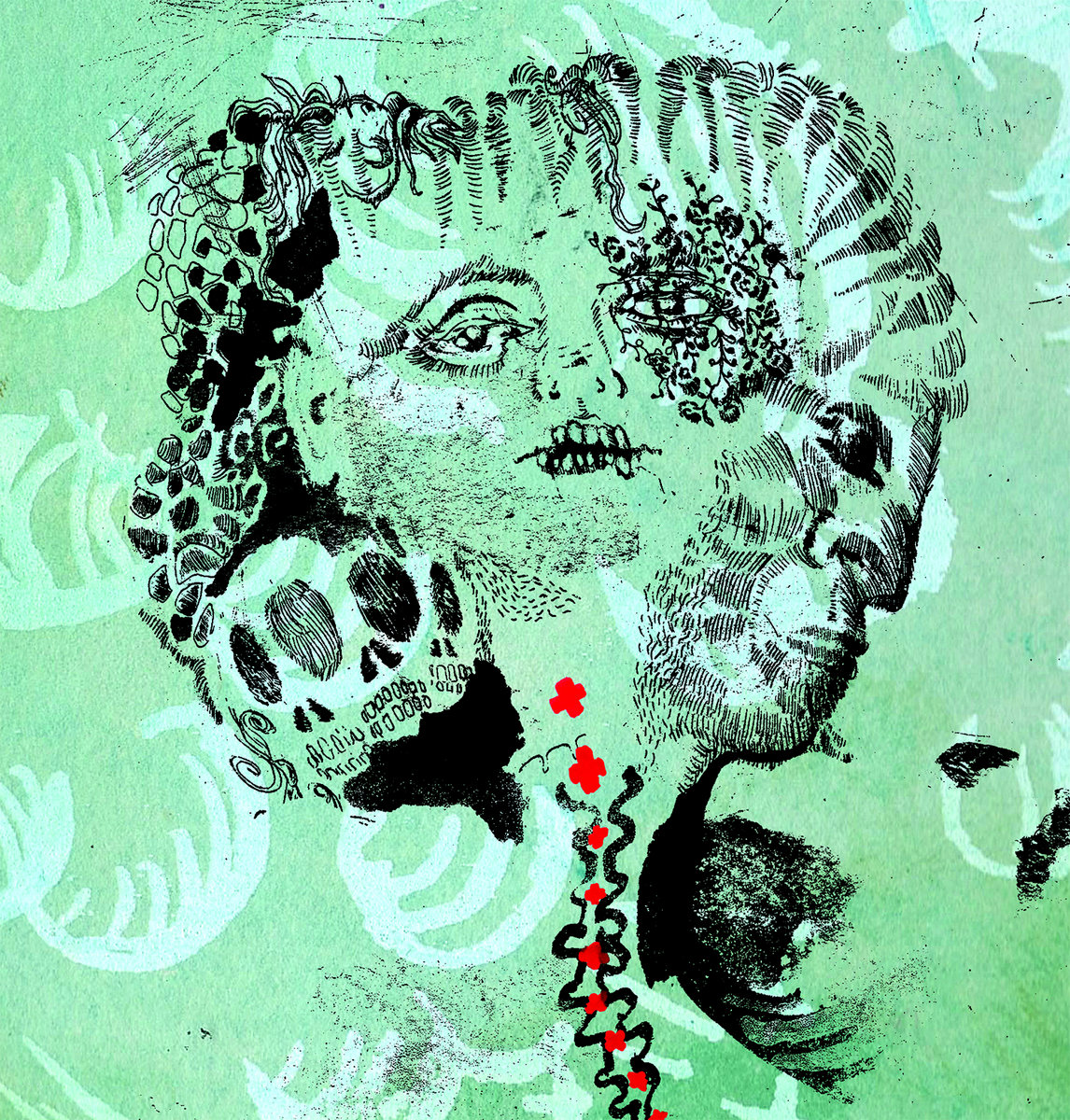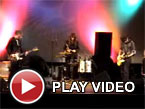Big Blood, "First Aid Kit"
 This latest LP from Big Blood is their first for Ba Da Bing and a spiritual successor of sorts to Do You Want to Have a Skeleton Dream?, as the band are back in "full family trio retro-pop extravaganza" mode. For the most part, Quinnissa (who was apparently only 13 when this album was recorded) handles the lead vocals for a series of hooky, bass-driven garage rock nuggets, though there are also a couple of headier Colleen-sung gems for fans of the band's darker, more psychedelic side. Notably, Caleb's frayed yelp is entirely absent from the proceedings, but it probably would have felt out of place among the unabashed throwback pop fare. Moreover, First Aid Kit feels like a full-on Quinnissa showcase, which makes for a rather unique entry in the Big Blood canon, as she is one hell of a belter and also spontaneously improvised all her lyrics during recordings. As Caleb notes in the album description, being in a band with your teenage daughter is admittedly something of a messy and volatile situation ("lots of practices end with her being tossed from the band"), but I can see why they are sticking with this format, as Quinnissa increasingly feels like a pop supernova in its formative stages.
This latest LP from Big Blood is their first for Ba Da Bing and a spiritual successor of sorts to Do You Want to Have a Skeleton Dream?, as the band are back in "full family trio retro-pop extravaganza" mode. For the most part, Quinnissa (who was apparently only 13 when this album was recorded) handles the lead vocals for a series of hooky, bass-driven garage rock nuggets, though there are also a couple of headier Colleen-sung gems for fans of the band's darker, more psychedelic side. Notably, Caleb's frayed yelp is entirely absent from the proceedings, but it probably would have felt out of place among the unabashed throwback pop fare. Moreover, First Aid Kit feels like a full-on Quinnissa showcase, which makes for a rather unique entry in the Big Blood canon, as she is one hell of a belter and also spontaneously improvised all her lyrics during recordings. As Caleb notes in the album description, being in a band with your teenage daughter is admittedly something of a messy and volatile situation ("lots of practices end with her being tossed from the band"), but I can see why they are sticking with this format, as Quinnissa increasingly feels like a pop supernova in its formative stages.
This album's overall feel is something akin to a raucous wedding reception in which members of The Cramps and B-52's join forces for a spirited and spontaneous set of half-remembered '60s bubblegum pop covers. The opening "In My Head" represents that vein in its purest form, as it is built from little more than a meaty bass line, a simple thumping beat, and a subtly surf-damaged guitar tone. The most perfect iteration of that aesthetic comes much later on the album, as "1000 Times" feels like a raw and raucous cover of an imagined classic by someone like The Ronettes. Elsewhere, the dark paranoia of "Never Ending Nightmare" is yet another notable Quinnissa showcase, though its unsettling subject matter is nicely invigorated by a bouncy bassline, quirky percussion, and a killer chorus hook. Quinnissa also handles lead vocals on "Infinite Space," but that piece feels like a comparative anomaly more akin to Big Blood's non-Quinnissa fare. It still feels a bit unusually anthemic and driving for a Big Blood song, but reaching infinitely to space is a more traditional lyrical theme for the band and there are some very cool howling psych touches in the periphery. Admittedly, a lot of Quinnissa's lyrics sound like they were composed by a 13-year-old, but as the album's description insightfully observes, "teenage impulses fit right in with the band's intent, which is making music that's honest, inclusive and flawed." To their everlasting credit, Big Blood seem to be endlessly resourceful in their balancing of flawed spontaneity and thoughtful art, as Mulkerin harvests "the ghostly presence of past takes" as a subtly trippy background layer throughout the album.
To my ears, the strongest pieces on the album are "Ring Telephone Ring" and "Makes Me Wonder." The former is a Barbara Lynn cover transformed into a smoldering, psych-damaged slab of country heartache and beautifully continues Big Blood's near-unbroken run of perfectly chosen and brilliantly executed homages to their favorite songs. It is also a prime example of this album's unusually nuanced approach to psychedelia, as Colleen's sensuous vocals leave a ghostly haze of harmonies in their wake. Similarly weighty is "Makes Me Wonder," which is dedicated to Ma'kihia Bryant, an Ohio 16-year-old murdered by a cop. Given its dark inspiration, it is unsurprisingly a fiery piece, but it is also a wonderfully driving and lushly psychedelic one, as Mulkerin allows himself to go a bit wild on the production side, resulting in a swirling feast of harmonized Siren-esque vocals, field recordings, sound collage elements, and dreamy synths (courtesy of guest Chris Livengood). It almost feels like it could be a stomping, muscular Kate Bush cover that plunges into a gently lysergic rabbit hole, as the gorgeous chorus hypnotically repeats as the piece descends deeper into hazy trippiness. The closing comedown "Weird Road Pt. 1" offers yet another throwback to more traditional Big Blood fare, as it is a Colleen-sung reverie that seems like it is built from little more than harmonium drones and a lazily swooping synth melody (though the buried ghostly vocal layers add a wonderfully hallucinatory touch).
As far as album-length Big Blood statements are concerned, I would personally categorize First Aid Kit as a fun (if uneven) detour rather than a fresh classic, but the album's reception thus far indicates that I am in the minority on that. I suppose it all depends on which side of Big Blood one prefers: the fun, spontaneous and punchy side or out-of-body transcendence of songs like "Destin Rain." For those of us in the latter camp, First Aid Kit will probably never be in heavy rotation as much as some other Big Blood albums, but "Ring Telephone Ring" and "Makes Me Wonder" would certainly earn a place on the imaginary self-curated greatest hits retrospective in my head.



